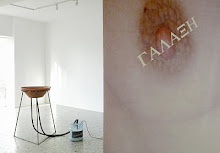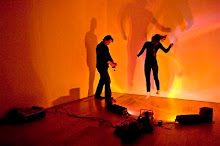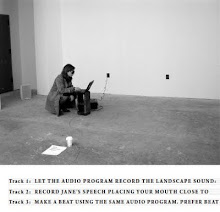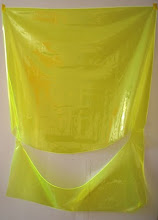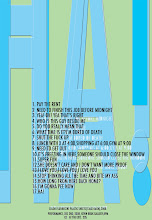4/15/2010
Note to NY
Hello NY,
You look very very pretty today
I like the way you smell, some kind of a perversive sticky little thing in the air
and the trees are greener and the chicken ready to go
I like it here on the bench when i lean on the side and i catch a side of yours
returning home, one or the other, closer is a dog, further away a black bird
one's plastics left over, nails holding dirt
If you promise me you'll stay pretty i'll stay more
You look very very pretty today
I like the way you smell, some kind of a perversive sticky little thing in the air
and the trees are greener and the chicken ready to go
I like it here on the bench when i lean on the side and i catch a side of yours
returning home, one or the other, closer is a dog, further away a black bird
one's plastics left over, nails holding dirt
If you promise me you'll stay pretty i'll stay more
4/13/2010
Note
When I use the I in my notes it doesn't mean that my notes are personal or refer to me.
Also, that I doesn't mean one I, my I and only. The notes are texts that carry a certain function because they depend on another text in order to appear. In comparison to any other form of written text the note can be found stuck on a fridge, it can sometimes be a doodle, one sentence, fragment of thought written parallel to a printed text inside a book, in a magazine, on a receipt, on a staple. Notes are peripheral texts that add, erase, make comments and file. The underlined text in a book is also a note. When you read and you exclude a passage from the whole by underlining it, most times you are using a pencil or a pen or these fluo markers which I remember liking when I was little, but at that time I was underlining everything. Anyways, similarly when I have a fragment written here, it is an underlined text taken from a book or a magazine or it is a text I found somewhere, maybe I can call it underline instead of note. Well, hm, I'll keep it with this name for now. The note name.
Also, that I doesn't mean one I, my I and only. The notes are texts that carry a certain function because they depend on another text in order to appear. In comparison to any other form of written text the note can be found stuck on a fridge, it can sometimes be a doodle, one sentence, fragment of thought written parallel to a printed text inside a book, in a magazine, on a receipt, on a staple. Notes are peripheral texts that add, erase, make comments and file. The underlined text in a book is also a note. When you read and you exclude a passage from the whole by underlining it, most times you are using a pencil or a pen or these fluo markers which I remember liking when I was little, but at that time I was underlining everything. Anyways, similarly when I have a fragment written here, it is an underlined text taken from a book or a magazine or it is a text I found somewhere, maybe I can call it underline instead of note. Well, hm, I'll keep it with this name for now. The note name.
4/11/2010
Note/ Guy Debord/ Howls for Sade (fragment)
Voice 2: We were ready to blow up all the bridges, but the bridges let us down.
Voice 1: Twelve-and -a-half-year-old Madeleine Reineri, who under the stage name "Pirouette" starred in the Alpes-Grenoble radio program Happy Thursdays, threw herself into the Isere River.
Voice 2: Mademoiselle Reineri of the Europe Quarter, you still have your wonderstuck face and that body, the best of promised lands. Like neon lights, the dialogues repeat their definitive truths.
Voice 1: I love you.
Voice 4: It must be terrible to die.
Voice 1: See you later.
Voice 4: You drink far too much.
Voice 1: What are childhood loves?
Voice 1: I knew it. And there was a time that I regretted it very much.
Voice 4: Whould you like an orange?
Voice 1: The beautiful breakups of volcanic islands.
Voice 1: In the past.
Voice 4: I have nothing more to say to you.
Voice 2: Once again, after all the untimely answers and the aging of youth, night falls from on high.
Voice 2: Like lost children we live our finished adventures.
Voice 1: Twelve-and -a-half-year-old Madeleine Reineri, who under the stage name "Pirouette" starred in the Alpes-Grenoble radio program Happy Thursdays, threw herself into the Isere River.
Voice 2: Mademoiselle Reineri of the Europe Quarter, you still have your wonderstuck face and that body, the best of promised lands. Like neon lights, the dialogues repeat their definitive truths.
Voice 1: I love you.
Voice 4: It must be terrible to die.
Voice 1: See you later.
Voice 4: You drink far too much.
Voice 1: What are childhood loves?
Voice 1: I knew it. And there was a time that I regretted it very much.
Voice 4: Whould you like an orange?
Voice 1: The beautiful breakups of volcanic islands.
Voice 1: In the past.
Voice 4: I have nothing more to say to you.
Voice 2: Once again, after all the untimely answers and the aging of youth, night falls from on high.
Voice 2: Like lost children we live our finished adventures.
4/03/2010
Note/ if i was to make movements for this text i would love to be the door
1. Configuration of the Room Entrance
1.1 Entrance to the room is made more difficult by the need to negotiate six steps.
1.1.1 The steps lead 'upwards', to a 'higher' plane.
1.2 The door is located on the stairs (second step) This poses a further, but not the final, difficulty.
1.3 Blocked by the risers, the door only opens outwards, away from the stairway, much like those pivoting barriers, at certain border crossings that are set up against concrete blocks, so they can only open opposite the direction of travel.
1.3.1Opening the door forces one to take a step backwards, down on the first step
(p.92)
The Poetics of a Wall Projection
Jan Turnovsky
1.1 Entrance to the room is made more difficult by the need to negotiate six steps.
1.1.1 The steps lead 'upwards', to a 'higher' plane.
1.2 The door is located on the stairs (second step) This poses a further, but not the final, difficulty.
1.3 Blocked by the risers, the door only opens outwards, away from the stairway, much like those pivoting barriers, at certain border crossings that are set up against concrete blocks, so they can only open opposite the direction of travel.
1.3.1Opening the door forces one to take a step backwards, down on the first step
(p.92)
The Poetics of a Wall Projection
Jan Turnovsky
4/02/2010
Note
When you are back lingering me from the point of question to the question mark I am out. Your ceiling demonstrates suffering and I can't stand watching it. I closed the door behind, it is the same morning. You are asleep and I am counting stars. Animals in diagrams, thinking ways of shrinking. Hold my throat/stab my back/squeeze my nipple/scratch my ear/bite my fingers/ lick my head/stand on your feet/fall down/ all/ tender kiss me/glue me on your chest and try elsewhere. This is how the night unfolds and now I only see the question marks.
There is no certainty, we are words; the closer i look at you, the further away you move, the closer you look at me the further away I move
There is no certainty, we are words; the closer i look at you, the further away you move, the closer you look at me the further away I move
Εγγραφή σε:
Σχόλια (Atom)















